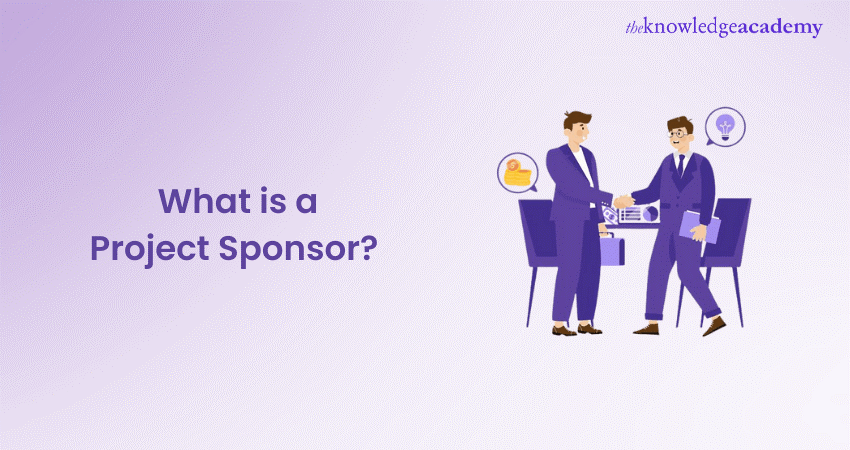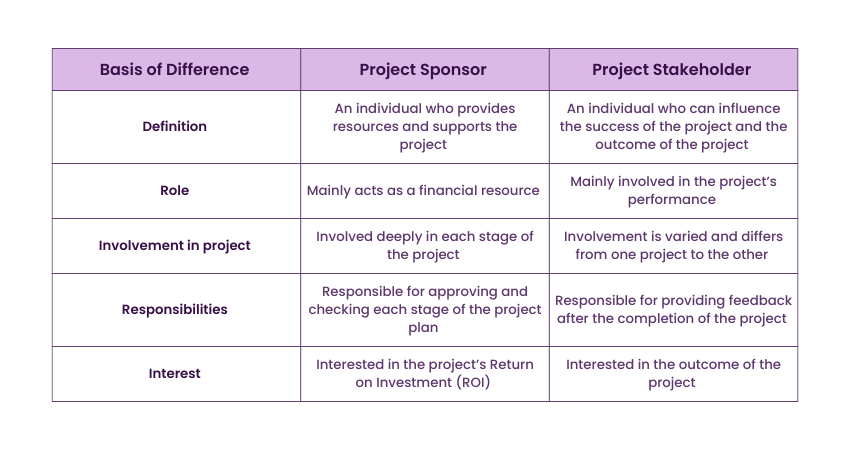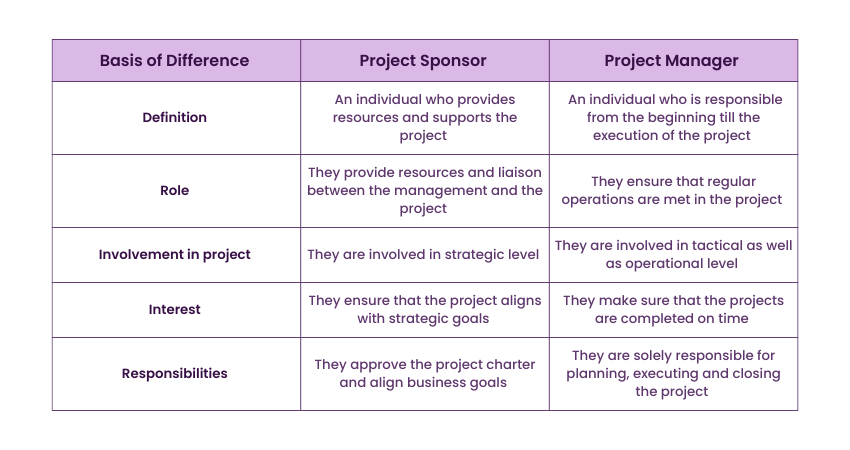We may not have the course you’re looking for. If you enquire or give us a call on +0800 780004 and speak to our training experts, we may still be able to help with your training requirements.
We ensure quality, budget-alignment, and timely delivery by our expert instructors.

Ever found yourself navigating a high-stakes project without the essential support and direction from senior leadership? This scenario underscores the question “What is a Project Sponsor” and highlights the importance of a Project Sponsor. The Project Sponsor are the key figures who provide guidance, resolve conflicts, and maintain transparent communication among stakeholders. Without their involvement, projects can easily derail, leading to wasted resources and missed deadlines.
Still wondering What is a Project Sponsor and why are they indispensable for project success? In this blog, we will explore the roles and responsibilities of a Project Sponsor, highlighting how their active participation can make or break a project. Read to know more!
Table of Contents
1) Overview of a Project Sponsor
2) Role of Project Sponsor
3) Responsibilities of a Project Sponsor
4) Project Sponsor vs Project Stakeholder
5) Project Sponsor vs Project Owner
6) Project Sponsor vs Project Manager
7) Five Tips for Working With a Project Sponsor
8) Conclusion
Overview of a Project Sponsor
A Project Sponsor is the leader who oversees the project at a higher level in Project Management. They rank higher than the Project Manager. These Project Sponsors are responsible for getting a project done to ultimately be able to realise the values and benefits associated with its completion.
Thus, they are primarily included at the early stage of the project, since the Sponsor initiates or supports the idea and only after that does the project get started.
Role of Project Sponsor
To enhance your comprehension of the Project Sponsor’s role and their organisational contributions, consider the following elucidated points.
Setting Goals and Estimating the Project Benefits
a) Defining Project Success
Clearly outline measurable goals and objectives that define what success looks like for the project.
b) Estimating Project Benefits
Evaluate the potential financial, operational, or strategic advantages the project can deliver.
c) Aligning Team Objectives
Ensure all team members understand and work towards the same goals for seamless collaboration.
d) Communicating Project Goals
Effectively share goals and benefits with stakeholders to secure their support and commitment.
Establishing Project Governance Guidelines
a) Creating a governance framework
Set up decision-making structures, escalation paths, and accountability systems for the project.
b) Defining Roles and Responsibilities
Ensure each team member and stakeholder understands their specific duties to avoid confusion.
c) Appointing Key Personnel
Select a project manager and steering committee to provide leadership and oversight throughout the project lifecycle.
d) Establishing Communication Protocols
Develop clear communication channels to maintain transparency and resolve conflicts quickly.
e) Monitoring Governance Adherence
Regularly review project progress to ensure compliance with established governance practices.
Establishing the Project Vision
a) Crafting a Compelling Vision
Define the project’s overarching purpose and the long-term value it aims to deliver.
b) Aligning the Vision With Organisational Goals
Ensure the project vision supports the broader strategic objectives of the organisation.
c) Communicating the Vision Effectively
Inspire the team and stakeholders by clearly articulating the project’s purpose and desired outcomes.
d) Championing the Vision
Reinforce the importance of the vision during meetings and progress updates to keep everyone focused.
e) Using the Vision as Motivation
Leverage the project vision to drive engagement, enthusiasm, and commitment among team members.
Master task management, track progress effortlessly, and collaborate seamlessly – sign up for our Jira Training today!
Responsibilities of a Project Sponsor
A project sponsor plays a pivotal role in guiding a project to success. Typically a senior executive, they ensure the project aligns with organisational goals and delivers value. Here’s how their responsibilities are divided across the project phases:
1) Initiation
a) Define the project’s vision and ensure alignment with business objectives.
b) Select a capable project manager and provide mentorship throughout the project.
c) Negotiate funding and secure necessary resources for the project.
d) Act as the spokesperson to senior management and stakeholders on behalf of the project.
Unlock the potential to seamlessly lead complicated projects – join our PgM (Programme Management) Course now!
2) Planning
a) Contribute to creating the project charter and defining the project scope.
b) Establish clear success criteria and gain stakeholder buy-in.
c) Offer strategic guidance to ensure the project’s feasibility and alignment with goals.
3) Implementation
a) Maintain open communication with the project manager, team, and stakeholders.
b) Monitor progress, addressing risks and changes as they arise. -
c) Provide knowledge and guidance to the project manager as needed.
d) Advocate for the project’s value and ensure it remains prioritised within the organisation.
4) Closing
a) Review the project’s outcomes against the defined success criteria.
b) Ensure the project delivers the intended value and benefits.
c) Support the transition from project delivery to business as usual.
d) Document and share lessons learned to enhance future projects.
With responsibilities spanning every phase, a project sponsor ensures the project remains focused, aligned, and successful while supporting the team and driving value for the organisation.
Project Sponsor vs. Project Stakeholder
Here are some differences between Project Sponsor and Project Stakeholder:

Project Sponsor vs. Project Manager
Now, let’s have a look at the differences between Project Sponsor and Project Manager:

What are Examples of Project Sponsors?
Project sponsors are typically senior executives who provide strategic direction and support to ensure project success. For example, in a software company, a senior director may act as a sponsor for a new product development project, overseeing updates, guiding the team from planning to launch, and ensuring smooth implementation.
How do you get a Project Sponsor?
To secure a project sponsor, identify someone whose goals align with your project. Craft a compelling proposal that highlights objectives, benefits, and organisational value. Network through meetings or events to build rapport and present your idea effectively.
Once their interest is gained, define their role and show how their involvement supports success. Keep communication clear and provide regular updates to maintain engagement. A strong pitch and consistent collaboration will help secure their sponsorship.
Conclusion
In conclusion, understanding What is a Project Sponsor is crucial for any project’s success. Their role spans from initiation to closing, ensuring alignment with strategic goals. By effectively fulfilling these responsibilities, Project Sponsors pave the way for seamless project execution and successful outcomes.
Master the principles of Project Management and drive impactful results – sign up for our Project Management Certification now!
Frequently Asked Questions
What are the Benefits of Being Mentored by a Project Sponsor in Advancing my Career?

Being mentored by a project sponsor provides insights into strategic decision-making, leadership skills, and organisational priorities. Their guidance can enhance your problem-solving abilities, expand your professional network, and position you for leadership roles by aligning your goals with organisational success.
How can a Project Sponsor Facilitate Career Advancement Opportunities Within an Organisation?

By engaging you in strategic projects and offering mentorship, they enhance your visibility, foster the development of essential skills, and prepare you for promotions or more demanding roles within the organisation.
What are the Other Resources and Offers Provided by The Knowledge Academy?

The Knowledge Academy takes global learning to new heights, offering over 3,000 online courses across 490+ locations in 190+ countries. This expansive reach ensures accessibility and convenience for learners worldwide.
Alongside our diverse Online Course Catalogue, encompassing 19 major categories, we go the extra mile by providing a plethora of free educational Online Resources like News updates, Blogs, videos, webinars, and interview questions. Tailoring learning experiences further, professionals can maximise value with customisable Course Bundles of TKA.
What is Knowledge Pass, and How Does it Work?

The Knowledge Academy’s Knowledge Pass, a prepaid voucher, adds another layer of flexibility, allowing course bookings over a 12-month period. Join us on a journey where education knows no bounds.
What are the Related Courses and Blogs Provided by The Knowledge Academy?

The Knowledge Academy offers various Prince2 Training, including the Agile Programme Management (AgilePgM) Course and SAFe Agile Product Management Training, and Agile Project Management Green Belt Course. These courses cater to different skill levels, providing comprehensive insights into Project Risk Management Explained.
Our Project Management Blogs cover a range of topics related to Project Management, offering valuable resources, best practices, and industry insights. Whether you are a beginner or looking to advance your Project Management skills, The Knowledge Academy's diverse courses and informative blogs have you covered.
Upcoming Project Management Resources Batches & Dates
Date
 Introduction to Project Management Course
Introduction to Project Management Course
Fri 14th Mar 2025
Fri 9th May 2025
Fri 15th Aug 2025
Fri 10th Oct 2025
Fri 12th Dec 2025






 Top Rated Course
Top Rated Course



 If you wish to make any changes to your course, please
If you wish to make any changes to your course, please


